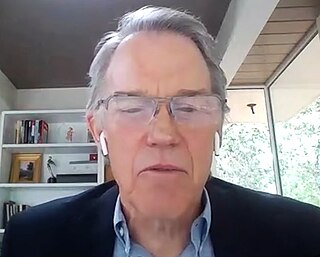Related Research Articles

Stanford University is a private research university in Stanford, California. The campus occupies 8,180 acres, among the largest in the United States, and enrolls over 17,000 students. Stanford has been considered to be one of the most prestigious universities in the world.

The Hoover Institution is an American public policy think tank that promotes personal and economic liberty, free enterprise, and limited government. While the institution is formally a unit of Stanford University, it maintains an independent board of overseers and relies on its own income and donations. It is widely described as a conservative institution, although its directors have contested its partisanship.

Larry Jay Diamond is an American political sociologist and leading contemporary scholar in the field of democracy studies. Diamond is a senior fellow at the Freeman Spogli Institute for International Studies, Stanford University's main center for research on international issues. At the Institute Diamond served as the director of the Center on Democracy, Development, and the Rule of Law from 2009-2016. He was succeeded in that role by Francis Fukuyama and then Kathryn Stoner.

Stephen David Krasner is an American academic and former diplomat. Krasner has been a professor of international relations at Stanford University since 1981, and served as the Director of Policy Planning from 2005 to April 2007 while on leave from Stanford.

Robert Owen Keohane is an American academic working within the fields of international relations and international political economy. Following the publication of his influential book After Hegemony (1984), he has become widely associated with the theory of neoliberal institutionalism in international relations, as well as transnational relations and world politics in international relations in the 1970s.
Avner Greif is an economics professor at Stanford University, Stanford, California. He holds a chaired professorship as Bowman Family Professor in the Humanities and Sciences.
James L. Gelvin is an American scholar of Middle Eastern history. He has been a faculty member in the department of history at the University of California, Los Angeles (UCLA) since 1995 and has written extensively on the history of the modern Middle East, with particular emphasis on nationalism and the social and cultural history of the modern Middle East.
Svetlana Leontief Alpers is an American art historian, also a professor, writer and critic. Her specialty is Dutch Golden Age painting, a field she revolutionized with her 1984 book The Art of Describing. She has also written on Tiepolo, Rubens, Bruegel, and Velázquez, among others.
Josiah Ober is an American historian of ancient Greece and classical political theorist. He is Tsakopoulos-Kounalakis Professor in honor of Constantine Mitsotakis, and professor of classics and political science, at Stanford University. His teaching and research links ancient Greek history and philosophy with modern political theory and practice.
Stanford University has many centers and institutes dedicated to the study of various specific topics. These centers and institutes may be within a department, within a school but across departments, an independent laboratory, institute or center reporting directly to the dean of research and outside any school, or semi-independent of the university itself.

Ian Matthew Morris is a British historian, archaeologist, and Willard Professor of Classics at Stanford University.
Terry Lee Anderson is an academic and author primarily focused on the intersection of economic and environmental issues in America. Anderson's works argue that market approaches can be both economically sound and environmentally sensitive. Influenced by the Austrian school of economic thought, his research helped launch the idea of free-market environmentalism and has prompted public debate over the proper role of government in managing natural resources.

Terry M. Moe is a professor of political science at Stanford University, a senior fellow at Stanford University's Hoover Institution, and a member of the Hoover Institution’s Koret Task Force on K-12 Education. Moe is a political scientist, an education scholar, and a bestselling author. He has a B.A. in Economics from the University of California, San Diego, and a Ph.D. in Political Science from the University of Minnesota. At Stanford, he holds an endowed professorship of political science called the William Bennett Munro professorship.

Debra Satz is an American philosopher and the Vernon R. & Lysbeth Warren Anderson Dean of the School of Humanities and Sciences at Stanford University. She is the Marta Sutton Weeks Professor of Ethics in Society, Professor of Philosophy and, by courtesy, Political Science. She teaches courses in ethics, social and political philosophy, and philosophy of social science.
Suzanne Scotchmer was an American professor of law, economics and public policy at the University of California, Berkeley and also a noted author on many economic subjects. She earned her B.A. from University of Washington magna cum laude in 1970, her M.A. in statistics from UC Berkeley in 1979, and her PhD in economics from UC Berkeley in 1980.
Irus Braverman is a legal scholar and ethnographer, and is a professor of law and an adjunct professor of geography at the University at Buffalo (SUNY). She was born in Jerusalem.
Charles William Calomiris is an American financial policy expert, author, and Director of the Center for Politics, Economics and History at UATX. Previously, he was a professor at Columbia Business School, where he was the Henry Kaufman Professor of Financial Institutions and the Director of Columbia Business School Program for Financial Studies.

Ilya A. Strebulaev is a Russian- American financial economist, researcher, author, and speaker with expertise in venture capital, startups, and corporate innovation. He has been a professor at the Stanford Graduate School of Business since 2004. From 2018 to 2022 he was on the board of directors of Yandex, the Russian equivalent of Google.

Elizabeth C. Economy is an American scholar, foreign policy analyst, and expert on China's politics and foreign policy. She is Senior Advisor for China to the Secretary of Commerce in the Biden administration and Senior Fellow at the Hoover Institution at Stanford University.
Richard Paul Saller is an American professor of European studies. He is the former provost of the University of Chicago and the former dean of the School of Humanities and Sciences at Stanford University, where he is currently the university's president.
References
- ↑ "Stephen Haber's Profile | Stanford Profiles". profiles.stanford.edu. Retrieved 2023-04-20.
- ↑ "Alumnus Haber Selected to Receive Distinguished Alumni Scholar Award". www2.gwu.edu. Retrieved 2023-04-20.
- ↑ "A Brief Chronicle of IRiSS Milestones | Institute for Research in the Social Sciences". iriss.stanford.edu. Retrieved 2023-04-20.
- ↑ "Hoover IP² Launched". Hoover Institution. Retrieved 2023-04-20.
- ↑ "Working Group On The Foundations Of Long-Run Prosperity About". Hoover Institution. Retrieved 2023-04-20.
- ↑ "H&S Dean's Teaching Awards | Stanford Humanities and Sciences". humsci.stanford.edu. Retrieved 2023-04-20.
- ↑ "Hoover senior fellow Stephen Haber was awarded the Allan V. Cox Medal for faculty excellence in fostering undergraduate research". Hoover Institution. Retrieved 2023-04-20.
- ↑ "Phi Beta Kappa Teaching Prize | Phi Beta Kappa". phibetakappa.stanford.edu. Retrieved 2023-04-20.
- ↑ "Haber receives second teaching award". Hoover Institution. Retrieved 2023-04-20.
- ↑ "Lloyd W. Dinkelspiel Awards | Student Services". studentservices.stanford.edu. Retrieved 2023-05-09.
- ↑ "Hoover senior fellow Haber awarded prestigious Hughes Prize for excellence in teaching". Hoover Institution. Retrieved 2023-04-20.
- 1 2 Haber, Stephen H.; Charles W. Calomiris (2014). Fragile by Design: The Political Origins of Banking Crises and Scarce Credit. Princeton University Press. ISBN 9780691155241.
- ↑ The Battle over Patents: History and Politics of Innovation. Oxford, New York: Oxford University Press. 2021-08-20. ISBN 978-0-19-757616-8.
- ↑ Haber, Stephen H. (2011-04-02). "The Ecological Origins of Economic and Political Systems". SSRN. doi:10.2139/ssrn.1667332. S2CID 16532491. SSRN 1667332.
- ↑ "Interview discussing rainfall and democracy". Bloomberg. Retrieved 9 January 2014.
- ↑ CEEY, Publicaciones (2018-06-08). "Los buenos tiempos son éstos. La incursión de los bancos extranjeros en México después de un siglo de crisis bancarias". Centro de Estudios Espinosa Yglesias (in Mexican Spanish). Retrieved 2023-04-20.
- ↑ Haber, Stephen; Klein, Herbert S.; Maurer, Noel; Middlebrook, Kevin J. (2008). Mexico since 1980. The World Since 1980. Cambridge: Cambridge University Press. ISBN 978-0-521-84641-7.
- ↑ Haber, Stephen; Razo, Armando; Maurer, Noel (2003). The Politics of Property Rights: Political Instability, Credible Commitments, and Economic Growth in Mexico, 1876–1929. Political Economy of Institutions and Decisions. Cambridge: Cambridge University Press. ISBN 978-0-521-82067-7.
- ↑ Haber, Stephen H. (1989). Industry and Underdevelopment: The Industrialization of Mexico, 1890-1940. Stanford: Stanford University Press. ISBN 978-0-8047-1487-7.